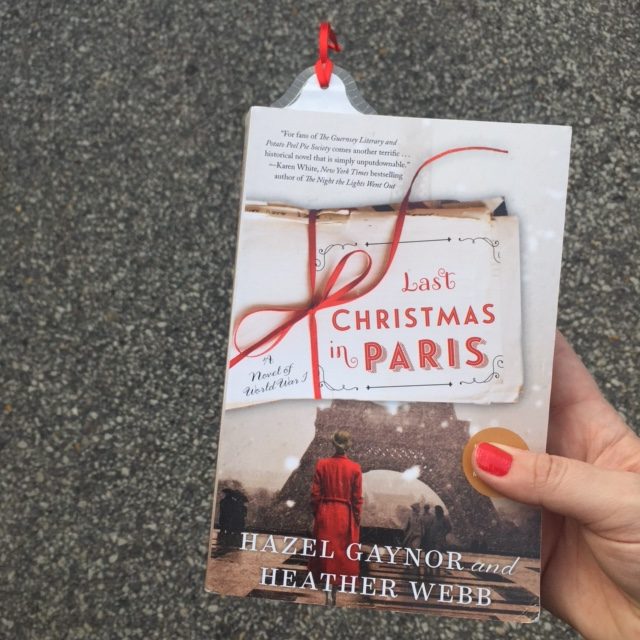 Last Christmas in Paris by Hazel Gaynor, Heather Webb
Last Christmas in Paris by Hazel Gaynor, Heather Webb Published by William Morrow on October 3, 2017
Pages: 400
Source: the publisher
Buy from Amazon|Buy from Barnes & Noble|Buy from Book Depository
Goodreads

New York Times bestselling author Hazel Gaynor has joined with Heather Webb to create this unforgettably romantic novel of the Great War.
August 1914. England is at war. As Evie Elliott watches her brother, Will, and his best friend, Thomas Harding, depart for the front, she believes—as everyone does—that it will be over by Christmas, when the trio plan to celebrate the holiday among the romantic cafes of Paris.
But as history tells us, it all happened so differently…
Evie and Thomas experience a very different war. Frustrated by life as a privileged young lady, Evie longs to play a greater part in the conflict—but how?—and as Thomas struggles with the unimaginable realities of war he also faces personal battles back home where War Office regulations on press reporting cause trouble at his father’s newspaper business. Through their letters, Evie and Thomas share their greatest hopes and fears—and grow ever fonder from afar. Can love flourish amid the horror of the First World War, or will fate intervene?
Christmas 1968. With failing health, Thomas returns to Paris—a cherished packet of letters in hand—determined to lay to rest the ghosts of his past. But one final letter is waiting for him…
I received this book for free from the publisher in exchange for an honest review. This does not affect my opinion of the book or the content of my review.
Review:
I almost don’t know where to begin with this one because I loved it so much.
Last Christmas in Paris by Hazel Gaynor and Heather Webb begins in 1968 with Thomas Harding traveling back to Paris for his last Christmas (no spoiler there, see title) with a bundle of letters, a nurse, and failing health. He settles in at his Paris apartment to reminisce over those letters, and the other part of the story is then told: beginning in 1914 when Thomas goes to fight in World War I and continues thru the end of the war in 1918. The 1968-POV elicits emotion because it is clear that Thomas is near the end and that he is grieving the loss of someone that he loves tremendously. The exact reasons for traveling to Paris aren’t entirely clear in the beginning, but the full significance unfolds slowly over the course of the book.
This book is mostly epistolary in structure, told through letters and a few telegrams. The characters are corresponding from their positions along the Front in WWI back to their friends and family and coworkers in England. These letters start out being encouraging and positive and “Hope you’re back by Christmas!” and eventually contain tales of heartache and grief as everyone realizes that the boys won’t be home for Christmas and that the war will be longer than they expected and more costly in terms of casualty.
Even though the tone of the letters took a more emotional turn as the story progressed, I found myself increasingly hooked to the correspondence and I cared more and more for each of the characters with each page.
Thomas is trying to run his family business, a newspaper, from his place as an officer in the thick of battle-a task that is nearly impossible. He finds himself having to enlist help from back home that he isn’t sure he can trust. Evie grows more attached to Thomas with every letter that she writes and worries every day that she doesn’t receive a letter from her brother Will, who really doesn’t care that much for writing letters. Alice, Evie’s best friend, isn’t content to sit back and not help, so she volunteers to nurse the wounded soldiers, which excites Evie and also terrifies her.
Evie uses her writing skills to make a difference, creating a very popular column in Thomas’ newspaper about the war from a woman’s perspective, which causes some big issues and conflicts. It also leads to bigger opportunities for Evie. Her relationship with Thomas-which may or may not have escalated over correspondence, mind you-is so frustrating to Evie. She knows how she feels but she truly isn’t sure how Thomas feels.
“I try to cheer myself with your letters. It might sound silly but I have come to think of your handwriting as you.”
The emotion from Evie over her confusing relationship with Thomas, along with all of the emotion from the war and from these characters about the things going on in their lives, made me HANG ON THESE WORDS. All of the conflicts are so doggone good and engaging to me as a reader even though they’re all addressed to someone else directly. I think there is something special about the characters speaking to one another in letters and being descriptive about what they see, hear, wish for, long for, feel. I feel like I’m peeping into their lives; it almost feels scandalous.
I could not stop reading, especially as I got closer and closer to the end because there were a few super intense things that happened with the plot closer toward and I was genuinely afraid for a few of the people that I had grown close to. And I’ll be honest: I cried for the last fifty-ish pages at the end. I think it was a combination of being so invested in the story and of hoping for the best, and then finally getting to the end and seeing what happens with everyone.
I just loved this one and I’m excited about rereading it with the audiobook. After I finished, I took a peep at the audio details and saw that it has a full cast of narrators and the sample sounds wonderful. I’m DYING to take a listen to the book for a reread.
Such a marvelous story! This one is great for those that love historical fiction, particularly the World War I era, or those readers that enjoy exceptionally well-done epistolary novels. I can’t wait for everyone to read this book. It was a complete joy for me the entire time that I read it.

HarperCollins | Amazon | Barnes & Noble






Thanks for your great review. I love the books of both Authors so I’m really excited to read this.
Carol L
Lucky4750 (at) aol (dot) com!
I can see why you loved this book so much – it looks amazing!
Thanks for being a part of the tour.